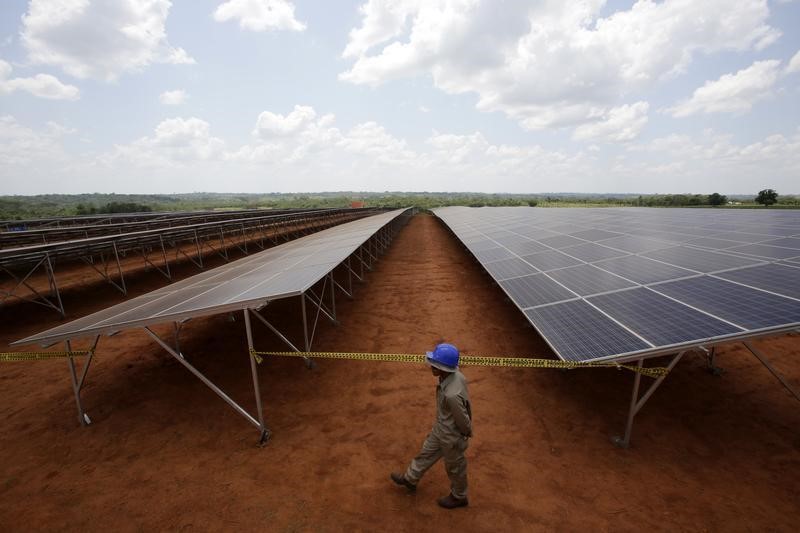
A 40 meter long photovoltaic computer which provides clean water, while generating electricity to recharge external devices, has been designed by an Italian company for use in the developing world. Watly, set up by entrepreneur Marco Attisani, has started an Indiegogo campaign to fund the third version of its solar technology.
 |
A 40 meter long photovoltaic computer which provides clean water, while generating electricity to recharge external devices, has been designed by an Italian company for use in the developing world. Watly, set up by entrepreneur Marco Attisani, has started an Indiegogo campaign to fund the third version of its solar technology.
"What you are looking at is a big machine, it's an infrastructural machine. It's 40 meters long, 15 meters wide, and 15 tonnes," Attisani told Reuters. "Primarily it's a computer, a big computer that deals with things that computers do normally. They calculate, they broadcast, they collect, they send them to the cloud, they interact with humans."
The Watly 3.0 thermodynamic computer uses solar energy to sanitize more than 5,000 liters of water a day, as well as generating electricity and connectivity.
The machine combines photovoltaic and thermal solar technologies. Solar heat collected by vacuum-tubes is used to vaporize and sanitize water fed into the machine. It can clean contaminated water, including ocean water, within two hours.
The photovoltaic panels located on the roof generate off-grid electricity to power the internal electronics of the machine, and also for recharging external devices such as mobiles phones and portable computers. "Watly purifies water from any source of contamination - chemical, bacteriological, or physical - without the need of filterings," said Attisani. "It also generates electricity because it combines also photovoltaic technologies and through photovoltaic technologies we actually generate electricity off the grid that can be used for empowering the machine itself, the electronics inside the machine but as well for recharging external devices - thousands of them, such as portable phones, computers."
According to Attisani, similar products use reverse osmosis - otherwise known as filtering - which requires expensive maintenance.
The company says that a single unit will last for 15 years and, because it is emission free, can save as much as 1,000 tonnes of greenhouse gas emissions (CO2), equivalent to 2,500 barrels of oil, while purifying millions of liters of water and generating 1GWh (1,000 megawatt hours) of free electricity. Each unit communicates with a Central Network Management Platform, and also other units via radio-link, 3G or 4G networks, or satellite connections. Individual units can be adjusted to changes in climate or environment.
Attisani says that while one Watly is a stand-alone machine, using two or more Watly becomes a network that can power cities.
The company successfully trialled its second, far smaller, prototype, the Watly 2.0, in Abenta Village, Ghana last October. Attisani, Watly CEO and founder, told Reuters it transformed Abenta, providing what he calls the three pillars that modern society needs to prosper: water, power and connectivity.
He believes the technology will prove empowering for impoverished communities. "This technology does not patronize them with water wells," said Attisani. "I'm not at all criticizing this solution but you can't uplift a community around the world in the 21st Century by digging wells. People are made of water, but they need much more than water. You need to bring the 21st Century technology. You need to bring there water, yes; electricity which is the fire of the modern era, and connectivity because if you are off-line you are not in the present."
A single unit will cost 400,000 euros (450,000 USD), but Attisani expects the cost to be borne by outside investors. "These are investments that normally are carried out by big investors, public sectors," he said. "This is establishing a technological paradigm. The users will pay as they go. That means they pay for the water they collect and electricity that they use, but the entire infrastructure big corporations and public sector will pay for that. And the point is that this machine is a vending machine. It pays back its own investment in six months, 18 months." Watly won two rounds of the prestigious European Union (EU) sponsored award, Horizon2020, which helped fund the first pre-industrial version of Watly 3.0. The device will be presented in September 2016.
(Source: Reuters)





